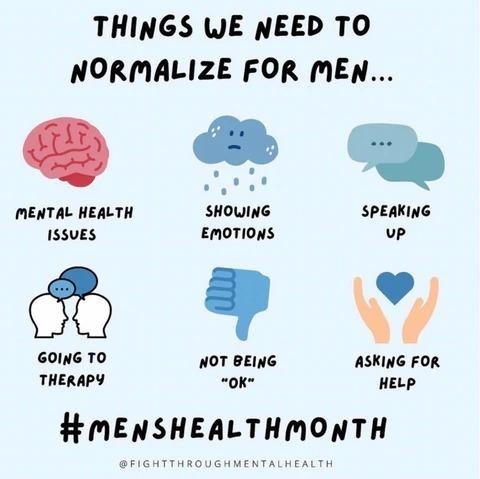How to talk to the men in your life about mental health
cultural expectations, outdated gender roles, and fear of judgment can keep men from opening up. However, if you’re someone who cares about the men in your life – whether it’s a father, brother, friend, partner, or colleague – knowing how to support them is vital.
Key Principles for Supportive Conversations
- Avoid being pushy or trying to “fix” things: Allow them to share their thoughts and emotions without interrupting or offering unsolicited advice.
- Focus on empathy and active listening: Show that you care about their well-being and are willing to listen without judgment.

Tips for Starting the Conversation
Be patient and understanding: Recognize that it may take time for the person to open up and share their concerns.
Supporting Men’s Mental Health
- Encourage self-care: Support the person in engaging in activities that promote relaxation and stress reduction, such as exercise, meditation, or spending time in nature.
Building Trust: The Foundation of Meaningful Conversations
When approaching conversations about mental health with men, it’s essential to prioritize building trust. Men are often socialized to associate vulnerability with weakness, so it’s crucial to approach these conversations with sensitivity and care.
Key Principles for Building Trust
- Start with genuine care and connection: Approach the conversation with a genuine desire to understand and support the person, rather than trying to “fix” things.
- Avoid judgment and agendas: Refrain from making judgments or trying to impose your own solutions. Instead, focus on creating a safe and non-judgmental space for the person to open up.
- Use open and empathetic language: Show that you’re actively listening and care about the person’s well-being. Use phrases like:
- Why Trust Matters

- Trust is the foundation of honest conversations: Without trust, conversations may remain superficial, and the person may be hesitant to open up about their true feelings and concerns.
- Trust allows for vulnerability: When men feel safe and supported, they’re more likely to be vulnerable and honest about their struggles.
By prioritizing trust and approaching conversations with empathy and care, you can create a safe and supportive environment for men to open up and share their thoughts and feelings..
Using Everyday Moments to Open Up Conversations
Having big, sit-down conversations can feel intimidating. Sometimes, the best conversations happen during everyday activities like:
- Driving: The relaxed atmosphere of a car ride can make it easier to talk about sensitive topics.
- Cooking: Preparing a meal together can create a sense of camaraderie and make it easier to discuss important topics.
- Working side by side: Engaging in a shared activity can reduce the pressure of eye contact and make conversations feel more natural.

Benefits of Using Everyday Moments
- Reduced emotional intensity: Everyday activities can help diffuse tension and make conversations feel less overwhelming.
- Less pressure from eye contact: Some men may find direct eye contact uncomfortable during serious conversations. Everyday activities can alleviate this pressure.
Leading by Example: Sharing Your Own Experiences
Men often struggle to open up unless someone else goes first. By being open about your own mental health, you’re modeling what vulnerability looks like and showing that it’s safe. Try saying:

- “I’ve been feeling overwhelmed lately. It wasn’t until I said it out loud that I realized how much I was carrying.”
Benefits of Sharing Your Experience
- Normalizes mental honesty: By sharing your own struggles, you help create an environment where mental health discussions are normalized.
- Encourages reflection: When men hear about others’ struggles, it can make it easier for them to reflect on their own challenges.
- Creates a safe space: By being vulnerable, you show others that it’s safe to do the same.
Recognizing Signs of Crisis and Taking Action
If someone you care about is showing signs of severe distress, such as:

- Withdrawing from everything: Avoiding social interactions, work, or activities they once enjoyed.
- Expressing hopelessness: Talking about feeling hopeless, helpless, or having no reason to live.
- Mentioning suicidal thoughts: Directly or indirectly referencing self-harm or suicide.
How to Respond
- Ask empathetic questions: Don’t be afraid to ask direct but compassionate questions, such as:
- “thinking about hurting yourself?”
- Don’t try to fix it alone: You don’t need to have all the answers. Your role is to be present and support them in getting professional help.
- Seek additional resources: Reach out to mental health hotlines or crisis services in your area for guidance and support.
Final Thoughts
- Fosters stronger connections: Builds trust, understanding, and deeper relationships.
- Encourages courage: Gives men the courage to be real, vulnerable, and honest about their struggles.
A Crucial Reminder
- Men deserve healing too: Just like anyone else, men deserve to heal, grow, and live a fulfilling life.
- Empathy and love matter: Showing empathy and love can make a significant difference in someone’s life.
